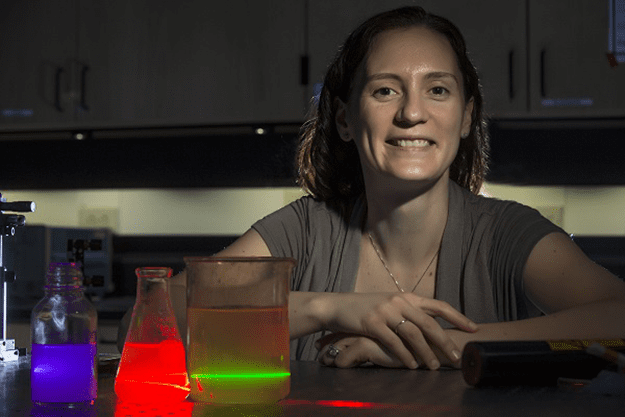
25 Apr New Morgridge researcher receives NSF CAREER Award
By Lexy Brodt, UW-Madison College of Engineering
Melissa Skala, who will join the Morgridge Institute for Research and the Department of Biomedical Engineering as an associate professor in summer 2016, has received a prestigious CAREER award from the National Science Foundation.
The NSF CAREER award, which is providing Skala with $510,000 over the next five years, gives promising young engineers the opportunity to explore new technologies and concepts, pushing the boundaries of contemporary science.
“It was surreal being chosen for this award, because it has been around for such a long time and recognizes some of the best, most famous scientists, so it was a shock to be in the same pool as these people who do all these wonderful things,” she says.
It will allow Skala to build an imaging system that can predict a cancer patient’s response to certain types of treatments. By taking a sample of a patient’s tumor, exposing it to a specific environment and testing various treatment options, Skala can calculate a patient’s response to a specific therapy without actually treating him or her. This process can help patients avoid the difficult trial-and-error process that usually comes with cancer treatment, since treatments are rarely—if ever—one size fits all. She will be focusing specifically on pancreatic cancer, breast cancer and oral cancer.
“We really want to improve the care of cancer patients; we don’t want them to have to undergo toxic treatments that won’t work for them,” she says. “We want them to have peace of mind and know they’re receiving treatment that will make them better.”
Through the flexible parameters of the NSF grant, Skala and her research team will be able to advance cell-level imaging technologies, making this type of treatment accessible, easy to use, and reliable in a clinical environment.
In addition to research, the career award also promotes outreach initiatives, particularly those designed to interest students living in rural areas of the country in science, engineering, technology and math, or STEM, fields. Skala previously partnered with schools in Nashville providing inexpensive experimental materials and video conference lab modules to demonstrate various concepts, and she will continue her outreach with schools in Washington.
Skala, who typically focuses on light-based optical imaging in the detection and treatment of cancer, earned her bachelor’s degree from Washington State University in physics before earning her master’s degree from UW-Madison in biomedical engineering in 2004. She pursued both her PhD and postdoctoral research at Duke University, and has been an assistant professor of biomedical engineering at Vanderbilt University since 2010.



